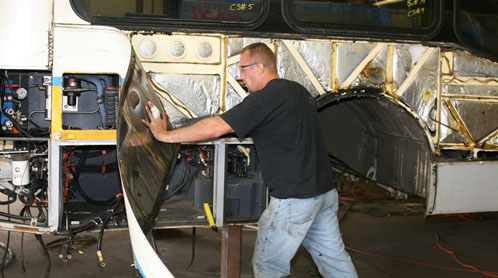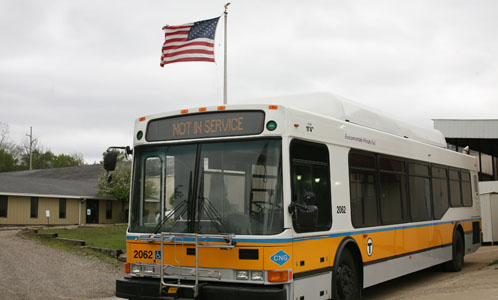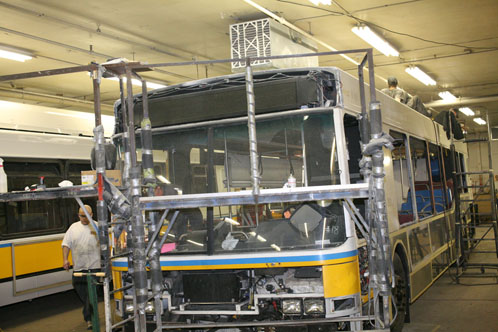
Midwest Bus refurbishes the MBTA fleet
By Carrie Rathbun Hawks

The Massachusetts Bay Transpor-tation Authority (MBTA), better known as the “T,” has a 300-year tradition of innovation and progress with mass transportation services. MBTA remains the nation’s fifth-largest mass transit system, serving a population of more than 4.6 million in 175 municipalities covering 3,244 square miles. The “T” maintains 183 bus routes, including rapid transit lines, streetcar routes, trackless trolley lines and commuter rail routes. The average weekday ridership for the entire system is approximately 1.1 million.
Its roster of equipment consists of 927 diesel and CNG buses, 32 dual mode buses, 28 ETBs (electric trolley buses), 408 heavy rail vehicles, 200 light rail vehicles, 10 PCC streetcars, 83 commuter rail locomotives, 410 commuter rail coaches, 298 specially equipped vans and sedans, and an additional 235 contractor-supplied, specially equipped vans and sedans.
Improving on the reliability and safety of city transit buses has long been a priority for the agency. One of the “T’s” initiatives is a cost-effective, midlife-overhaul program.
MBTA knew it had to complete a recent overhaul of its 300 NABI CNG buses with limited resources. It set about on a proactive effort to improve its fleet by having them remanufactured for greater energy efficiency and reliability using new technology. This midlife overhaul brings a vehicle back to a state of good repair and offers an opportunity to extend its useful life.
The “T,” along with its consultant Booze Allen Hamilton, prepared detailed specifications to enhance structural integrity, renew functional and mechanical systems, and address issues of overheating. BAH also provided professional inspection services prior to shipment and upon delivery. In order to ensure timely completion of this critical project, the “T” put the bid for remanufacture of 123 of its 300 buses. The complex project was awarded to Midwest Bus Corporation of Owosso, MI., which had completed four previous bus refurbishing projects for MBTA.

For many agencies, remanufacturing is a cost-effective use of funds that maximizes the effectiveness of scarce capital dollars. The average price of a CNG bus is in excess of $450,000. In contrast, remanufacturing these buses averages between $200,000 and $220,000 per bus, depending on the required repair. Scope of work can include electrical and cooling system upgrades, new body panels, damage-resistant front caps, cold-crank starting systems and extensive additions of stainless components.
A remanufactured bus has a life expectancy comparable to a new bus when all costs are considered.
Eco-minded operators consider remanufacturing as one of the ultimate forms of recycling, as all the reusable parts remain in operation as opposed to ending up in a landfill. Furthermore, recycling and reusing the reusable parts is a way to bypass the manufacturing process, which can have a dramatic impact on the company’s carbon footprint. Although bus refurbishment has been around for a while, the option is growing more popular because of limited budgets and a desire to be more environmentally friendly.
Government regulations can also play a part in a transit authority’s decisions on how it maintains its fleet. The Federal Transit Administration mandates that federally funded transit vehicles remain in service for a minimum of 12 years. FTA will help finance remanufacturing or midlife-overhaul projects that help buses meet or exceed their minimum useful life.
Midwest Bus has been in the business of remanufacturing buses since 1980. It has more than 50,000 square feet of manufacturing space with a 24-coach production capability and modern engineering technology. MBC has completed more than 100 projects since its beginning.
The company has 30 years of experience in repairing, replacing and modifying all components of a bus. This includes the underbody, structural, front and rear axles, flooring, engine, transmission, air conditioning, wheelchair restraints and lift systems, passenger seats, windows, exterior body and paint. In recent years, Midwest has expanded beyond the standard rebuilding and remanufacturing programs to include specialty work activities for transit authorities’ campaigning buses, including air conditioning, structural repair, repowering and installation of systems to improve fuel efficiency and reduce emissions.

“Our goal is to provide high quality products and services to our customers,” says Dan Morrill, founder and president of Midwest Bus. “We’ve built a reputation thanks to the great customers, employees and suppliers who have allowed us to serve the transit industry for more than 30 years. Giving the customer what it needs is the only way to do business.”
Midwest Bus begins its process with a complete “inbound” inspection to identify repairs necessary beyond the base scope of work. This requires a thorough function test as well as extensive underbody cleaning and evaluation. The MBTA project also included removal of all exterior skins for further structural inspection.
Technicians then remove, clean and inspect. Components such as brakes, steering, suspension, propulsion, air conditioning, wheelchair ramp and electrical Materials are delivered to Midwest’s warehouse where they are bar coded and placed into inventory. They install new components and make improvements to the original bus design as the customer requests.
This may include items such as the Engineered Machine Products (EMP) mini-hybrid coolant system, which replaces the hydraulic fan with eight smaller, electronically controlled fans that significantly increase fuel efficiency. Midwest also called on MRM Industries in Owosso to provide new, resin transfer-molded front caps for the Massachusetts Bay project. Kold-Ban International, Ltd. provided a super capacitor that is especially useful for starting the vehicles in cold conditions.
For the engines, MBC works with Cummins Bridgeway LLC, which provide significant engineering support to allow the engines to interface with the existing components of the buses.
With the finishing touches complete, the bus moves on for painting in one of two of Midwest’s fully equipped paint booths. Afterward, the vehicle is water tested in a simulated rain booth to ensure it is watertight.
“Clearly, our clients rely on their buses to move hundreds of thousands of people every day,” says Morrill. “We cannot afford to scrimp.” BR
